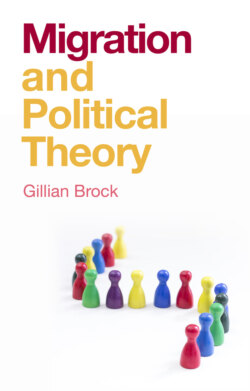Читать книгу Migration and Political Theory - Gillian Brock - Страница 25
2.2.5 Co-ownership of earth’s natural resources
ОглавлениеThe right to control borders presupposes that the state has moral authority to determine who may enter or remain on its territory. But some might question this assumption of the state system, perhaps by asking this question: Who, after all, owns the earth’s resources? On some accounts, such as that of Michael Blake and Mathias Risse (2007), all human beings are co-owners of the natural resources of the earth. So, as co-owners, they may have rights to migrate to territory that they co-own. When a state fails to provide what citizens need at the most basic level – either by being unable or unwilling to do so – it is not clear why those citizens should feel obligated to remain where they are, given that the justification for the state system would have failed.
Michael Blake and Mathias Risse (2007) have developed arguments for more open borders that are based on a view about ownership of the earth’s natural resources. The earth’s natural resources were originally owned in common by all humankind. So each person on earth today is a co-owner of all its resources. On their view, using the metric of population density, we can calculate for any state whether it is underusing, overusing, or appropriately using its resources. Individuals would have a claim to immigrate to any state underusing its resources. States may choose to pay compensation and restrict immigration, so it would not necessarily mean that individual claims are overriding. But Blake and Risse have, through this argument, at least made a case for more compensation to be paid to those whose permanent entry a state restricts.
